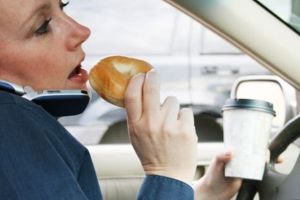
Put down the coffee, bagel or hairbrush and drive! Or else!
A bill winding its way through Trenton would impose stiff fines and even a possible license suspension for drivers who eat, drink, groom, read or use electronic devices behind the wheel.
Violators could face a $200 to $400 fine for the first offense and a $400 to $600 fine for a second offense. A third or subsequent offense could mean a fine of $600 to $800 and up to a 90 day license suspension, as well as motor vehicle points.
The sponsors of the bill, Assemblyman John Wisniewski, D- Middlesex and Nicholas Chiaravalloti, D-Hudson, said it is modeled after a law in Maine and is intended to educate, not punish drivers.
“The issue is that we need to try, in every way, to discourage distracted driving, it’s dangerous,” Wisniewski said. “Education and enforcement can change the attitudes of people.”
Some experts say that motorists must be discouraged from multitasking while driving. Others say the bill is an overreach and questioned how police could enforce it.
“This proposed distracted driving law is not needed, since three statutes can be used when a distraction causes unsafe actions, like swerving or crossing a line,” said Steve Carrellas, policy and government affairs director for the National Motorists Association state chapter. “There is unsafe driving, careless driving and reckless driving.”
Supporters of the bill must come to terms with the fact that a certain level of multitasking by drivers is a reality, Carrellas said.
“Would [the bill] make changing the radio station or adjusting the volume illegal? What about talking to a passenger?” Carrellas asked.
Arnold Anderson, the Essex County Community Traffic Safety Program coordinator, said its imperative that motorists break the habit of doing more than one thing while driving.
“You’ve got to get people out of the mindset of multitasking,” said Arnold Anderson, ” You can’t multitask. We are so far away from the mindset of … just drive.”
Officials from AAA said that a distraction law would be hard to enforce since an officer would have to observe how the driver was distracted, but also that the bill may have a higher purpose.
“The legislation introduced by Assemblyman Wisniewski, while admirable in theory, may not help police enforce the law,” said Tracy Noble, AAA Mid-Atlantic spokeswoman.
But a distraction law could have a similar effect as seat belt laws, which Noble and Anderson credited for increasing seat belt use in the state, even without fines.
“The more widespread the message of eliminating distractions becomes, the more likely it is to be ingrained in everyday behavior, similar to seat belt usage,” Noble said.
Currently, New Jersey has laws banning the use of hand-held cell phones and texting while driving, but no prohibitions of other behavior that is considered distracting, according to the state Division of Highway Traffic Safety.


